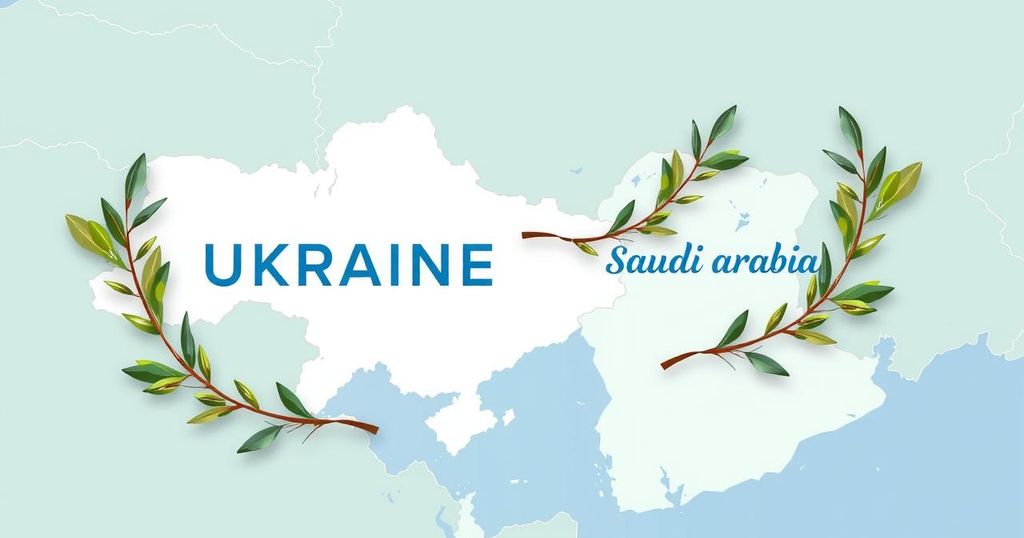Key Focus Areas in Upcoming US-Led Ukraine-Russia Ceasefire Talks

Ukraine and Russia are in ceasefire talks in Saudi Arabia, driven by U.S. President Trump’s call for a truce by Easter. Central issues include a proposed 30-day ceasefire on energy attacks and Russian territorial claims. The discussions occur amid skepticism from the Kremlin and ongoing military actions. Potential U.S. interests in Ukraine’s resources and security guarantees are also focal points in the negotiations.
Officials from Ukraine and Russia are currently engaged in ceasefire discussions in Saudi Arabia, with U.S. President Donald Trump advocating for a truce by Easter. Kyiv’s delegation participated in meetings with American officials in Riyadh, and a corresponding dialogue with Moscow is anticipated on the following day. These talks represent a rare opportunity for parallel negotiations since the onset of the full-scale invasion by Russia.
The U.S. aims to establish a ceasefire deal by April 20, a significant date coinciding with Easter celebrations. However, Kremlin spokesperson Dmitry Peskov expressed skepticism regarding a swift resolution, characterizing the negotiations as merely the initial step in what will be “difficult” discussions. Notably, the talks coincide with recent violent actions from Russia, including drone strikes in Kyiv that resulted in civilian casualties.
Central to the discussions is a proposal for a 30-day ceasefire concerning attacks on energy facilities, which both sides may explore further. Following a recent conversation, Trump and Putin indicated a willingness to initiate peace talks with this limited pause in hostilities. Nonetheless, skepticism exists, as Kyiv has accused Moscow of undermining agreements while continuing attacks on Ukraine’s critical infrastructure.
Mr. Peskov affirmed that negotiations would also consider the potential restoration of a Black Sea shipping agreement. Despite Russia’s earlier withdrawal from the arrangement, they expressed a readiness to resume talks, viewing them as beneficial. U.S. Special Envoy Steve Witkoff suggested optimism regarding the potential advancements during these meetings, especially concerning shipping in the Black Sea.
Another contentious issue is the recognition of Russian control over four Ukrainian regions, which remains a significant barrier in negotiations. While Russia has claimed these areas, Ukraine maintains that it will not concede its territorial integrity to Moscow. Discussions will also reflect on broader security guarantees for Ukraine during and after the conflict.
While there are suggestions from Ukraine to temporarily cede territory in exchange for NATO security assurances, Trump expressed doubts regarding the feasibility of NATO membership amidst Russian opposition. Concurrently, Britain and France are striving to create a coalition to provide military security guarantees for Ukraine, deeming this necessary as peace talks proceed.
U.S. interests in Ukraine’s mineral and energy sectors are also on the table, with potential implications for future U.S.-Ukraine relations. Trump has indicated a keen interest in securing U.S. stakes in Ukraine’s resources, which could help deter further Russian aggression.
Recent prisoner exchanges, with each side returning 175 individuals, indicate a move towards humanitarian considerations amidst wartime tensions. Furthermore, Putin has called for the easing of Western sanctions in exchange for peace, while Kyiv remains unable to hold elections under current martial law conditions, complicating political transitions amidst ongoing conflict.
The upcoming U.S.-led ceasefire negotiations in Saudi Arabia present a critical moment for Ukraine and Russia, with discussions focusing on a wide array of issues, including a 30-day ceasefire on energy attacks, territorial recognition, and security guarantees for Ukraine. While optimism exists about achieving a peace framework, significant challenges remain, particularly concerning territorial integrity and military conditions. Additionally, potential U.S. investments in Ukraine’s energy resources could influence future relations. The situation continues to evolve amidst ongoing violence and complex political dynamics.
Original Source: www.independent.co.uk







